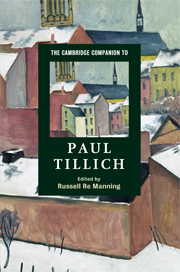Book contents
- Frontmatter
- Part I Standing within the theological circle
- Part II Theology of culture
- 8 Tillich’s analysis of the spiritual situation of his time(s)
- 9 Theology of culture and its future
- 10 Tillich’s theology of art
- 11 Tillich’s philosophy
- 12 Tillich’s ethics between politics and ontology
- 13 On the boundary of utopia and politics
- Part III Tillich in dialogue
- Bibliography
- Index
9 - Theology of culture and its future
from Part II - Theology of culture
Published online by Cambridge University Press: 28 May 2009
- Frontmatter
- Part I Standing within the theological circle
- Part II Theology of culture
- 8 Tillich’s analysis of the spiritual situation of his time(s)
- 9 Theology of culture and its future
- 10 Tillich’s theology of art
- 11 Tillich’s philosophy
- 12 Tillich’s ethics between politics and ontology
- 13 On the boundary of utopia and politics
- Part III Tillich in dialogue
- Bibliography
- Index
Summary
In order to rejuvenate Christian theology after the First World War, Paul Tillich, Karl Barth, Rudolf Bultmann and others insisted that theology reclaim as its proper object the reality of God. They sought to overcome the failure of cultural Protestantism and nineteenth-century liberal theologians to clarify the relation of Christian faith to cultural and social values. Among his contemporaries, Tillich conceived of the theological task in a distinctive way. The object of theological reflection is the depth, import or substance of human cultural activities. A theology of culture is thereby distinct from, if still related to, forms of theology in which the object of reflection is the God of the Bible within the faith of the church formulated in dogmas. This chapter explores Tillich's theology of culture mindful of the enduring task of Christian theology and his conception of religion and human spirit. The constructive claim advanced is that theology of culture must be reconceived in light of contemporary global dynamics. More pointedly, the connection between theology of culture, ethics and what Tillich called 'ecstatic humanism' will be developed. The position proposed advances the agenda of the theology of culture in a new way for a new age; it can be called 'theological humanism'. In a time when religions are shaping world-wide realities, sometimes violently and sometimes peacefully, it is important that they be given humane expression. Similarly, in an age of expanding human power, some ethical direction and limit to that power are needed in order to protect present and future life. These challenges define the future of theology of culture.
- Type
- Chapter
- Information
- The Cambridge Companion to Paul Tillich , pp. 138 - 151Publisher: Cambridge University PressPrint publication year: 2009
- 1
- Cited by



